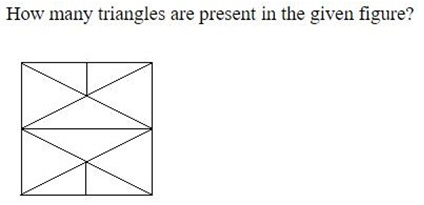Question
The average of 8 consecutive odd
numbers is 20. If the odd numbers immediately before and after this sequence of 8 odd numbers are also included, what will the new average be?Solution
ATQ, Total sum of 8 consecutive odd numbers = 20 X 8 = 160 According to Arithmetic progression: Sum = n/2[2a+(n-1)×d] [where n = number of terms, 'a' = irst term and 'd' = common dierence] Or, 160 = 8/2[2a+(8-1)×2] Or, 40 = 2a + 7 × 2 Or, 26 = 2a So, 'a' = 13 Last number = a + (n - 1) × d = 13 + (8 - 1) × 2 = 27 Previous odd number to these numbers = 13 - 2 = 11 And, next odd number to these numbers = 27 + 2 = 29 So, required average = (160+11+29)/10 = 200 ÷ 10 = 20 Alternate Solution Since, the number that are included is equally more and less than sum of the given 8 numbers, therefore, there eect will cancel out and the average will remain sum.
Who sits adjacent to N?
I) The one who faces G
II) The one who faces S
III) The one who faces E
How is K related to S?
In a certain code language, time is called watch, watch is called strap, strap is called leather, leather is called animal, animal is called brown, brow...
From the given options, select the word which cannot be formed using the letter of the word ‘PRIMARILY’, using the letters only once.
Identify the number, which when added to itself 14 times gives 540.
If it was Sunday on 1st April, 1956, then what was the day of the week on 2nd July, 1957?

'L - M ' means 'L is the brother of M'
'L # M' means 'L is the daughter of M'
'L * M' means 'L is the father of M'
'L $ M' means 'L...
QPO, NML, KJI,____, EDC
How many dots lie opposite the face having six dots, when the given figure is folded to form a cube?
Relevant for Exams:



